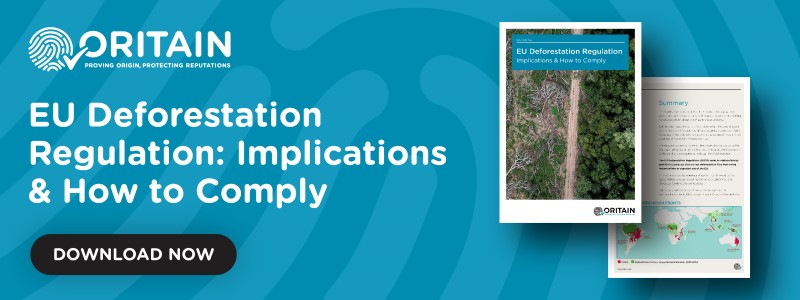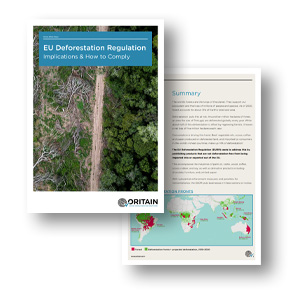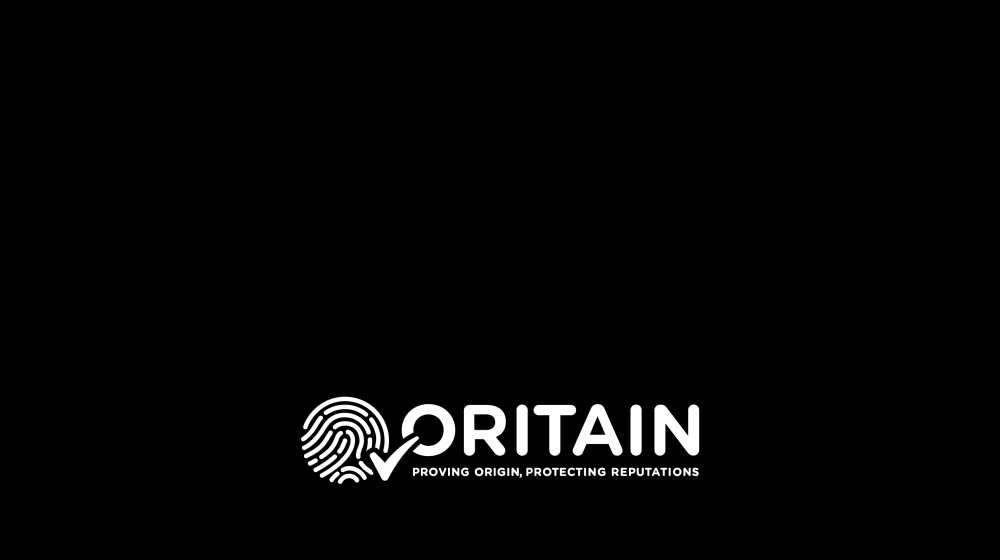The EU Deforestation Regulation (EUDR): What is it? What Does it Mean? How do I Comply?
By Michela Mossali | 19 March 2024
minutes to read.
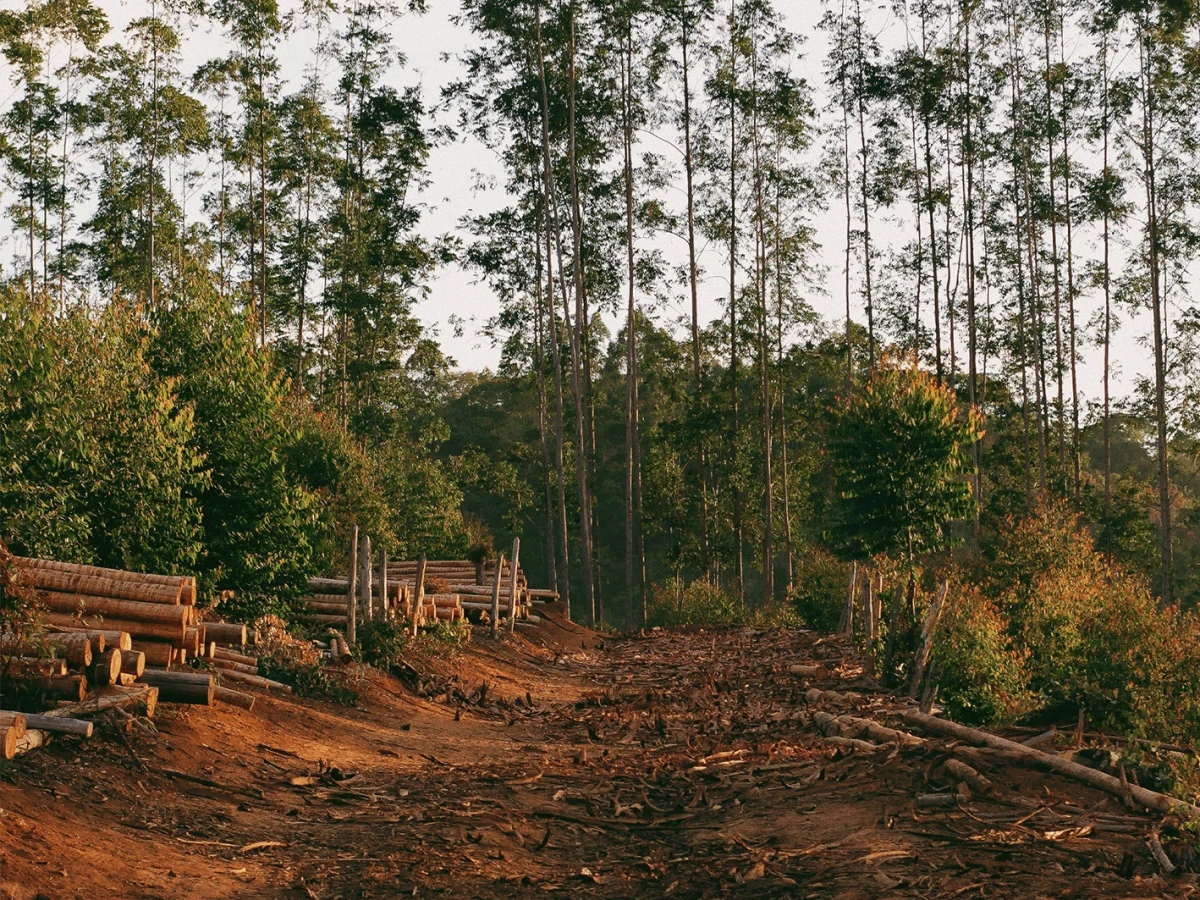
Updated 20 November 2024
Every year around ten million hectares of forest, an area the size of Portugal, are deforested globally. Only half of this deforestation is offset by regrowing forests.
The EU Deforestation Regulation (EUDR) seeks to address this by prohibiting products that are not deforestation-free from being imported into or exported out of the EU. With substantial enforcement measures and penalties for noncompliance, the EUDR puts businesses in these sectors on notice.
Implementation of the EUDR is imminent. With the legislation having been adopted in June 2023, large operators and traders now have until the end of December 2025 (and small companies a further 6 months) to ensure compliance.
In this article we’ll summarize the legislation, outline the risks and implications for business, and introduce a solution to support compliance.
Contents:
- Why does deforestation matter?
- What does the EUDR say?
- Which industries are covered by the EUDR?
- What actions must operators and traders take?
- What penalties does the EUDR impose?
- How proving product origin supports EUDR compliance
Why does deforestation matter?
Forests support the planet’s ecosystem and the lives of millions of people and species. As estimated 1.25 billion people around the world rely on forests for shelter, livelihoods, water, fuel, and food security.
Despite this, 2,400 trees are cut down every minute. In just over 100 years the world lost as much forest as it had in the previous 9,000 years – an area the size of the United States.
Deforestation also contributes to global warming, producing 4.8 billion tons of carbon dioxide per year.
European nations are significant players in this global drama, with 16% of tropical deforestation associated with international trade coming from the EU, second only to China.
In response, more than 100 countries pledged to stop and reverse deforestation by the end of the decade.
What does the EUDR say?
Under the EU Deforestation Regulation, only products from land non-degraded or deforested after December 31, 2020, will be allowed on the EU market or for export from the EU.
The EUDR prohibits importing into or exporting out of the EU products that:
- Are not deforestation-free
- Have not been produced in accordance with the relevant legislation of the country of production
- Are not covered by a due diligence statement
Operators and traders covered by the legislation will be required to trace commodities to the plot of land where they were produced and to verify those commodities are produced in conditions that comply with relevant laws in their country of origin, including laws on land-use rights, labor rights, and human rights.
Which industries are covered by the EUDR?
The EUDR applies to companies in the industries of palm oil, cattle, wood, coffee, cocoa, rubber, and soy, as well as derivative products including chocolate, furniture, and printed paper.
This encompasses the following commodities and their derivatives:
- Cattle
- Coffee
- Cocoa
- Palm oil
- Wood
- Rubber
- Soy
These industries are significant contributors to trade, with beef/cattle, coffee, cocoa, palm oil, and soy imports into the EU worth €85 billion per year.
The cattle industry is one of the leading drivers of deforestation, where cattle ranching for export is fueling deforestation and destruction in the Brazilian Amazon.
The world’s love of coffee is also leading to millions of acres of forests being cleared every year for coffee growing. Coffee accounts for over 7% of EU-driven deforestation.
Palm oil has been a significant driver of tropical deforestation. Seventy percent of the EU’s palm oil imports originate from Indonesia and Malaysia, countries likely to be classified as high-risk.
What actions must operators and traders take?
Businesses involved in the import or export of these commodities must carry out sufficient due diligence to determine whether they are deforestation-free. This includes a Mandatory Due Diligence system which includes:
- Collection of information demonstrating that relevant products are legally produced and deforestation-free (after 31 December 2020).
- Compiling a ‘Due Diligence Statement” including key requirements (country of production and geodata coordinates of the plots) and a risk assessment evaluation; this must be reviewed annually.
- Submitting the statement through the public information system.
The legislation makes clear that operators and traders “shall not place relevant products on the market or export them in case of lack of information, when they are not compliant or identify risks of non-compliance". If businesses cannot prove where their products originate from, they cannot prove compliance – and thus lose the ability to import.
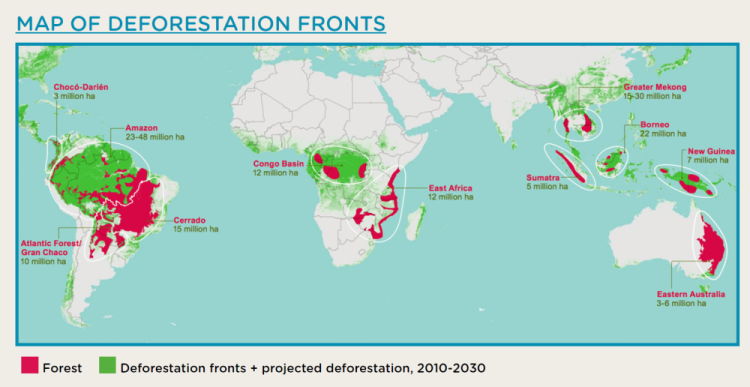
Source: worldwildlife.org
What penalties does the EUDR impose?
European authorities can impose corrective measures on any company found to have neglected its responsibilities. These include fines, prevention of product sale or distribution, product withdrawal and/or destruction, or mandated charitable donations.
While the regulation places penalties and fines at member states’ discretion, it recommends fines of at least 4% of a company’s EU turnover proportionate to the environmental damage and value of commodities.
The regulation will assign a level of risk related to deforestation and forest degradation to countries within and outside the EU, which will determine the level of obligation. Enhanced monitoring and enforcement will be in place for high-risk countries.
Although burden of proof is on importers, authorities will be responsible for enforcing the regulation and for performing checks and controls. The scope of these checks includes “on-the-ground examination of relevant products, field audits, and origin verification using technical and scientific means to determine the biological species or the place where the relevant commodity or product was produced, including anatomical, chemical or DNA analysis."
Proving from where products originate is therefore critical to ensuring compliance.
How proving product origin supports EUDR compliance
Defining specific point of origin is integral to ensuring compliance with the EUDR. The legislation obliges companies to precisely geo-locate the specific plot of land involved in the production or farming of their commodities.
Traceability technology provides independent third-party verification of product origin. Forensic verification methods, such as Oritain’s isotopic and trace element analyses, authenticate the claims made about the true origin of products or raw materials.
Proper diligence through the supply chain mitigates the risk for companies that believe they’re procuring an EUDR-compliant commodity, only to discover it’s sourced from a deforested area, potentially exposing the company to penalties.
Forensic testing can also help to determine whether EUDR-compliant materials have been mixed with or contaminated by products of unknown origin or produced in deforested areas. This analysis can then help authorities judge whether proper due diligence in respect of risk assessment and risk mitigation was undertaken.
Free download: EU Deforestation Regulation (EUDR) Whitepaper
Stay informed and compliant with the EUDR. Access our comprehensive whitepaper now.
Oritain’s scientific verification services support organizations in complying with and authorities in enforcing upcoming and existing legislations. We work in many of the industries covered by the EUDR and have a group of experts specializing in regulatory affairs, as well as a dedicated Government Services Team to support government agencies and regulatory bodies.
If your business needs to prove compliance with the EU Deforestation Regulation, talk to us.
How can companies and indigenous communities secure the future of forests?

Disclaimer: The information provided in this document does not and is not intended to constitute legal advice. Instead, all information presented here is for general informational purposes only. Counsel should be consulted with respect to any particular legal situation.
